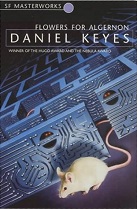Review of 'Flowers for Algernon'
Flowers for Algernon by Daniel Keyes
 Charlie Gordon is a floor sweeper at a bakery with an IQ of 68. As the subject of an experiment to increase intelligence, the weeks and months after the surgical procedure Charlie slowly gets smarter and smarter. As the process takes hold he comes to realize a number of painful truths about both his personal past and how he was treated when he was “retarded”. At first he is pitted at solving mazes with Algernon, a mouse who has undergone the same treatment, but early on Charlie loses every time. He very quickly comes to beat the mouse then onto reading, learning languages and writing scientific papers but along the way he forgets his humanity - His emotional maturity does not follow his rise in IQ. He alienates all of those he previously considered friends as he becomes aloof and distant, impatient at their slowness. As Algernon starts to show indications that he is losing his new intelligence the question is whether the same will happen to Charlie…
Charlie Gordon is a floor sweeper at a bakery with an IQ of 68. As the subject of an experiment to increase intelligence, the weeks and months after the surgical procedure Charlie slowly gets smarter and smarter. As the process takes hold he comes to realize a number of painful truths about both his personal past and how he was treated when he was “retarded”. At first he is pitted at solving mazes with Algernon, a mouse who has undergone the same treatment, but early on Charlie loses every time. He very quickly comes to beat the mouse then onto reading, learning languages and writing scientific papers but along the way he forgets his humanity - His emotional maturity does not follow his rise in IQ. He alienates all of those he previously considered friends as he becomes aloof and distant, impatient at their slowness. As Algernon starts to show indications that he is losing his new intelligence the question is whether the same will happen to Charlie…
“Flowers for Algernon” appeared on screen as “Charly” in 1968 and has been the subject of many a school English class. In fact, that is where I first saw this book many years ago but I never actually read it until just now. The book is written as a diary or “Progress Reports” written by Charlie as he undergoes treatment with the first chapters being hard to read with the poor grammar and atrocious spelling but as he gets smarter, obviously, the pose changes considerably. As he gets more intelligent I found it painful to learn of his mother's desire to push him aside for his “normal” sister. I wanted to shout at his blindness to the feelings of those around him as he is overwhelmed with his more intelligent brain but he plows on nevertheless. His happiness diminishes as time goes on and people leave him as they get disgusted with his attitude. I really felt for him but can see both sides to the story. Without giving anything away, I thought the ending was perfect and, to me, entirely predictable.
An interesting and intriguing easy-to-read story. Perhaps used as an English class reader, it is still worth a read by anyone else. Painful to read at times, it is a good fable that challenges what people often think about being intelligent.
Rating: “Nearly perfect, but not quite”
Review Date: 2016-04-26
Genre: Science Fiction
Publisher: Gollancz (SF Masterworks)
Publication Date: 1994
ISBN: 9781857989380